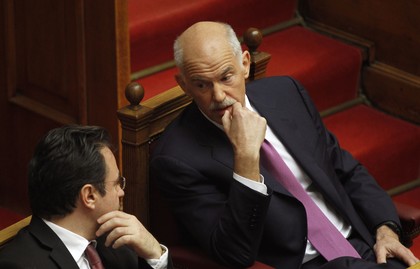By Stephen Castle
Europe’s leaders prepared the way for a second, large, bailout of Greece on Friday, pledging not to abandon the debt-laden nation to a default providing it votes a tough package of austerity measures through its Parliament next week.
“We have agreed that there will be a new program for Greece,” Chancellor Angela Merkel of Germany told reporters at the end of a two-day summit meeting in Brussels. “This is an important decision that says once again we will do everything to stabilize the euro overall.”
The comments came a day after Greece agreed with international creditors to more austerity measures as part of revised plans for 2011-15 designed to plug a gap in its future financing.
If the Greek Parliament approves this proposal next week, the E.U. and the International Monetary Fund will release a €12 billion, or $17 billion, tranche of emergency aid, and then put together a second rescue.
The shape and size of the new bailout could become clear on July 3 at a meeting of euro zone finance ministers in Brussels.
All this comes a little more than a year after the government in Athens won a package of loans worth €110 billion.
“Greece is supported,” the French President, Nicolas Sarkozy, said at a news conference. “Europeans trust the Greek authorities and Parliament in their endeavors to implement the bold measures that have been decided.”
After discussions with the Greek prime minister, George Papandreou, European leaders expressed confidence that Greece’s Parliament would approve the controversial austerity package, which has already prompted large protests in Athens.
Changes to the plan, negotiated with European and I.M.F. officials Thursday, are certain to make it even less popular still on the streets of Greece.
The new austerity program will now include a one-off solidarity levy on personal income ranging between 1 and 5 percent, according to income.
Meanwhile, the tax-free threshold on income will be lowered to €8,000 annually from the current level of €12,000, with the lowest rate set at 10 percent – but with exemptions for people up to 30 years old, pensioners over 65 and the disabled. There will also be an annual levy of €300 on the self-employed.
On Thursday, at a meeting of center-right parties in Brussels, the Greek opposition leader, Antonis Samaras, refused to bow to pressure to change course and support the new plan during next week’s parliamentary vote. During the discussion, Mr. Samaras was warned that Europe was engaged in a war for its economic stability, according to one official who requested anonymity due to the sensitivity of the discussion.
Reflecting the disappointment of European leaders at Mr. Samaras’s stance, Mrs. Merkel said that “it would be better to have the widest support.”
She also insisted that any new program for Greece should be monitored closely. “One needs to do a reality check on whether the assumptions are proved right,” she said.
Nonetheless, in a statement issued late Thursday, E.U. leaders accepted the need for a “new program jointly supported by its euro area partners and the I.M.F.”
That could amount to as much as €120 billion, though no figures have been identified yet as euro zone countries are negotiating with private investors to see how much their voluntary contributions could be.
After the meeting, Mr. Papandreou conceded that his country was on a “difficult path” but one that is “much better than the alternative path of defaulting.”
“I believe that this is something which is understood by the majority in the Greek parliament,” Mr. Papandreou said, adding that he was sure that the €12 billion emergency aid would be released next month.
At the summit meeting one obstacle to the new rescue was removed when the leaders agreed that non euro zone nations would not be obliged to contribute through a fund that they finance along with countries that use the single currency.
Britain objected to taking part, arguing that it had not participated in last year’s Greek package and has no plans to join the single currency.
For Britain, we weren’t involved in this bailout and we should not be involved, as a non-euro country, in anything that might happen subsequently,” Mr. Cameron said at a press conference.Some practical difficulties remain, including an insistence from Finland that any new loans to Greece should be guaranteed by collateral.
Separately, the leaders agreed that Croatia should join the Union, becoming its 28th member state. Negotiations with Croatia should be concluded by the end of June and — though not spelled out in the summit meeting communiqué — the target for Croatia’s accession is July 2013, the E.U. leaders agreed.
“We stand on the verge of a historic moment for Croatia and for the Western Balkans as a whole, and also for the European Union,” said José Manuel Barroso, president of the European Commission, the bloc’s executive.









